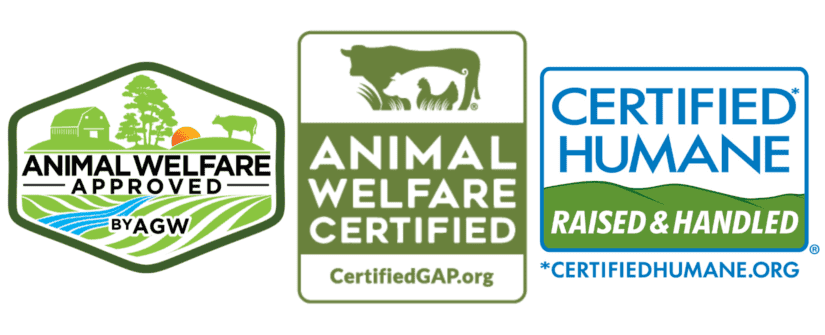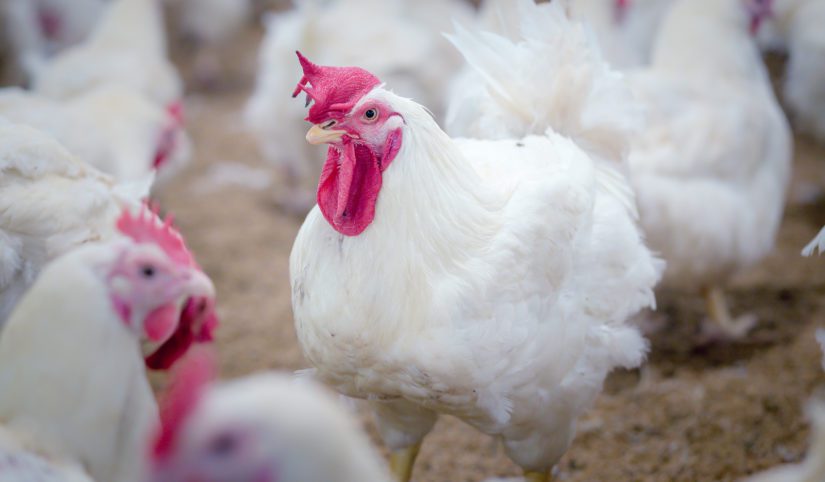In Canada, the Codes of Practice for the care and handling of farm animals set the minimum standard of care expected from all Canadian farmers. Higher-welfare refers to raising animals to higher standards than those in the Codes of Practice. But what exactly does this mean for chickens raised for meat?
Animal Welfare Approved, Animal Welfare Certified and Certified Humane certify farms that raise animals to higher standards of care. Let’s look at the main benefits of these animal welfare certification programs.

Environmental enrichment
Enrichment encourages the expression of natural behaviours. The Code of Practice for chickens raised for meat does not require many environmental enrichments. Litter (bedding) must be provided. This allows the birds to express some natural behaviours such as scratching and dustbathing. However, there are no requirements for perches or any other form of enrichment, such as foraging materials. Creating a stimulating environment helps keep birds active and can reduce harmful feather pecking behaviours. Examples include providing hay or straw bales, ramps, pecking blocks, raised platforms, or scattering foraging materials.
- Animal Welfare Approved – requires perches or other raised objects
- Animal Welfare Certified – requires perches and additional environmental enrichments such as hanging edible objects
- Certified Humane – environmental enrichments required such as tubes to run through (includes perches as an option)
Greater indoor space requirements
In Canada, most chickens raised for meat are housed loose in a barn with many other chickens. As per the Code of Practice, stocking densities for chickens must not exceed 31 kg/m2 normally (but can go up to 38 kg/m2). Chicken welfare can be improved by providing them with more space than required by the Code. Greater space allowances allows all birds to move around freely and have enough space to express natural behaviours.
- Animal Welfare Approved – minimum 0.06 square meters per bird
- Animal Welfare Certified – stocking density must not exceed 29 kg/m2 (Step 1 & 2); 27 kg/m2 (Step 3 and above)
- Certified Humane – stocking density must not exceed 30 kg/m2
No beak trimming
Feather pecking is common among chickens, and can be caused by frustration, stress, or boredom. To prevent feather pecking, chicks are often beak trimmed at the hatchery, which causes pain. The Code of Practice allows for the beaks of chicks to be trimmed. Animal Welfare Approved, Animal Welfare Certified, and Certified Humane prohibit beak trimming. Instead, these programs require more space and the use of enrichment to prevent feather pecking.
Outdoor access
Nearly all chickens in Canada are raised indoors and never step outside. Chicken welfare can be improved by allowing them the opportunity to explore the outdoors. This offers environmental enrichment and increased exercise.
- Animal Welfare Approved – outdoor access required by 4 weeks of age
- Animal Welfare Certified – outdoor access required by 4 weeks of age (only Step 3 and above)
- Certified Humane – does not require birds to have outdoor access (although recommended)
Due to the spread of Avian Influenza, all commercially-raised chickens are currently kept indoors.
Shorter transport times
In Canada, chickens can be transported for 24 hours without water, and 28 hours without feed or rest as per federal law. These transport times are much longer than recommendations from many scientific reports on animal welfare. They are also longer than the maximum transport times allowed by other countries. During transport, chickens can suffer due to improper handling, overcrowding in the trucks and exposure to temperature extremes. Animal Welfare Approved, Animal Welfare Certified and Certified Humane all have detailed transportation requirements that aim to ensure chickens are not caused unnecessary distress or discomfort. They also require significantly shorter transport times:
- Animal Welfare Approved – transport must not exceed 4 hours
- Animal Welfare Certified – transport must not exceed 6 hours (including loading time)
- Certified Humane – transport must not exceed 10 hours (including loading and unloading time)

It is true that eating less meat is the best choice for protecting animal welfare. There are many plant-based proteins that can be used in place of chicken. For those who purchase chicken, choosing higher-welfare is a great step towards improving the lives of chickens. By buying products certified by one of these programs, you can be confident knowing that you are supporting a better life for chickens and driving change along the food chain.
Learn more about higher-welfare food
FarmSense e-newsletter
Are you passionate about farm animal issues? Use the form below to subscribe to FarmSense e-newsletter. Four times per year you will receive news and information on what the BC SPCA is doing to help further farm animal welfare in Canada!
The BC SPCA uses your personal information to update you on our work for animals as well as for advertising and analytics purposes. More information on uses and how to opt-out can be found in our Privacy Policy.
